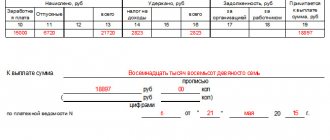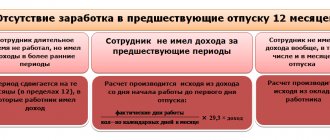Why is a vacation schedule necessary?
The vacation schedule is one of the most important documents in personnel records management, allowing qualitative regulation of employee vacation periods taking into account the needs and capabilities of the organization, while complying with the norms of labor legislation regarding the right of employees to annual rest.
There must be a vacation schedule where there is a team. The legal form in this case does not matter. This can be a legal entity (organization) or an individual (individual entrepreneur).
The vacation schedule is a unified form No. T-7, approved by Decree of the State Statistics Committee of the Russian Federation of January 5, 2004 No. 1, but in reality the organization has the right to independently decide to fill out the specified form No. T-7 or develop its own document form adapted for a specific organization .
What is the threat to an employer who breaks the law?
The employer's liability for failure to provide leave to an employee according to the schedule occurs if the manager unlawfully refused to provide the employee with rest, for which the latter went to court. Regulatory authorities can also identify violations during an inspection. Therefore, employers must not violate the Labor Code and act only within the law.
The following actions are considered a violation on the part of the head of the enterprise:
- denial to an employee of his/her due annual rest;
- failure to provide leave for more than two years in a row (even if the person himself wanted to work without legal rest);
- failure to pay vacation pay on time;
- replacing annual paid leave with monetary compensation;
- untimely provision of days off (violation of the approved schedule);
- refusal to provide a vacation period to an employee who is included in a preferential category and who, by law, is entitled to annual leave at a time convenient for him;
- lack of an approved vacation schedule.
For violating the rights of employees, the employer faces:
- warning;
- forcing the employee to provide the required days off;
- imposition of a penalty;
- disqualification of an official;
- suspension of activities for a certain period.
Which employees have priority when taking leave?
The employer must keep in mind that a number of employees have a legal advantage in granting them annual leave:
| Category of workers | Special conditions | Normative act |
| Husband | Annual leave is granted while his wife is on maternity leave, regardless of the time of his continuous work with this employer. | Art. 123 Labor Code of the Russian Federation |
| Persons working in the Far North and equivalent areas | Full or partial combination of annual paid leave | Art. 322 Labor Code of the Russian Federation |
| Working parent (guardian, custodian) | Annual paid leave or part thereof (at least 14 calendar days) to accompany a child under the age of eighteen years old entering educational programs of secondary vocational education or higher education located in another area. If there are two or more children, leave for this purpose is granted once for each child. | Art. 322 Labor Code of the Russian Federation |
| Parent (guardian, trustee, foster parent) raising a disabled child under the age of eighteen | Annual paid leave is provided at the request of the parent at a time convenient for him. | Art. 262.1 Labor Code of the Russian Federation |
| Workers under the age of eighteen | Annual paid leave is provided for a duration of 31 calendar days at a time convenient for them | Art. 267 Labor Code of the Russian Federation |
| Honorary Donor of Russia | Annual paid leave is provided at a convenient time. | Art. 23 Federal Law of July 20, 2012 No. 125-FZ “On the donation of blood and its components” (as amended and supplemented) |
| Heroes of the Soviet Union, Heroes of the Russian Federation and citizens who are full holders of the Order of Glory | Annual paid leave is provided at a convenient time. | Art. 9 Law of the Russian Federation of January 15, 1993 No. 4301-I “On the status of Heroes of the Soviet Union, Heroes of the Russian Federation and full holders of the Order of Glory” (with amendments and additions) |
| Citizens of the Russian Federation who found themselves in the zone of influence of unfavorable factors that arose as a result of the disaster at the Chernobyl nuclear power plant on April 26, 1986, or who took part in eliminating the consequences of this disaster. | Annual paid leave is provided at a convenient time. | Art. 14 Law of the Russian Federation of May 15, 1991 No. 1244-I “On the social protection of citizens exposed to radiation as a result of the disaster at the Chernobyl nuclear power plant” (with amendments and additions) |
| Citizens of the Russian Federation exposed to radiation as a result of nuclear tests at the Semipalatinsk test site | Annual paid leave is provided at a convenient time. | Art. 2 Federal Law of January 10, 2002 No. 2-FZ “On social guarantees for citizens exposed to radiation as a result of nuclear tests at the Semipalatinsk test site” (as amended and supplemented) |
| Military spouses | Leave at their request is granted simultaneously with the leave of military personnel | Art. 11 Federal Law of May 27, 1998 No. 76-FZ “On the status of military personnel” (as amended and supplemented) |
Does the boss have the right not to provide vacation without pay?
Leave without pay is regulated by Art. 128 Labor Code of the Russian Federation . It is provided at the request of the employee for one reason or another. The validity of these reasons is assessed by the employer, by agreement with whom the duration of the leave is determined.
Attention! Article 128 of the Labor Code of the Russian Federation reserves for the employer only the right to provide unpaid leave.
However, there are a number of cases when the employer is obliged to provide such leave, such cases are enshrined in the above article (participants of the Second World War; persons who have reached retirement age but continue to work; disabled people; cases of the birth of a child, marriage, etc.), in other cases it remains just rely on the benevolence of the leadership.
When can an employee reschedule vacation by deviating from the vacation schedule?
The regulations provide for reasons for postponing vacation, which can be either dependent on the employer and employee, or independent:
| Reasons beyond the employer's control | Sick leave for an employee during vacation |
| Performing government duties during vacation, if they involve release from work | |
| Employee arrest | |
| Holidays | |
| Reasons depending on the employer | Late payment of vacation benefits |
| Untimely (less than 2 weeks) notification of the employee about the start of vacation | |
| The impossibility of the employee’s absence from the workplace within the periods specified in the vacation schedule (in this case, the vacation must be granted no later than 12 months of the next working year) |
Example:
According to the vacation schedule at ABC LLC, accountant Kopeikin K.K. a vacation is planned for the period 04/15/2022-04/30/2022, but it is during this period that an unscheduled on-site audit by the tax authorities should be carried out. Kopeikin K.K. It is mandatory to attend this event; in addition, you need to carefully prepare for the inspection. In this case, the employee will be asked to postpone the vacation to another time convenient for him.
Answers to common questions
Question No. 1 : The employee wrote an application for early exit from maternity leave for up to three years and from the date of exit - an application for leave that was not previously used. Can an employer issue such leave?
Answer : Parental leave can be used at the employee’s discretion (Part 2 of Article 256 of the Labor Code of the Russian Federation), that is, he can go to work and go on parental leave at any time. When returning from maternity leave, the employer, at the request of the employee, is obliged to provide another leave.
Question No. 2 : Should an employer provide a part-time employee who is on maternity leave with up to 1.5 years?
Answer : An employee does not have the right to be on two vacations at the same time and receive two amounts of vacation pay. Therefore, in order to use the main leave, you need to receive an application for leave from parental leave and an application for the main leave, and after the main leave you can again write an application for leave to care for a child up to 1.5 years. In this case, child care benefits will not be paid, but only vacation pay will be received.
How long can an employee not use vacation?
In accordance with Art. 115 of the Labor Code of the Russian Federation, annual basic paid leave is provided to employees for a duration of 28 calendar days.
The employee has the right to divide the vacation, but not less than into periods of 14 days.
In Art. 124 of the Labor Code of the Russian Federation presents categories of employees who are prohibited from not using or postponing vacation for reasons beyond the control of the employee, which may lead to the failure to provide the next vacation in the current working year:
- employees who have not been on annual paid leave for 2 years;
- pregnant employees;
- workers under 18 years of age;
- workers whose jobs are recognized as hazardous or hazardous.
Example:
To the chief accountant of ABV LLC, P.P. Petrova. The next annual paid leave is planned according to the vacation schedule in the period from 04/26/2022 to 05/11/2022 Petrova P.P. is in her fifth month of pregnancy. Just during the period when the chief accountant should be on vacation, an on-site tax audit should be carried out. In this case, the postponement of vacation can only be at the initiative of the employee. At the initiative of the employer, transferring vacation will be illegal.
Does the employer have the right to refuse?
It has. This right was granted to him by Part 3 of Art. 124 Labor Code of the Russian Federation. But here two conditions must be met :
- Production necessity (the presence of a situation at the enterprise in which the provision of leave will negatively affect the production process). Whether such a situation arises in each specific case is up to the employer to decide.
- The presence of the employee’s consent to cancel his prescribed rest.
If the two above conditions are met, then the employer can postpone the vacation period to the next working year , however, such a vacation must take place during this next year, otherwise, during inspections by regulatory authorities, the employer may experience adverse consequences, which we will consider below. This is explained by the fact that the above article of the Labor Code of the Russian Federation directly prohibits not providing rest for two years in a row.
There are cases when an employee intends to exercise his right to rest at a time of his choosing for one reason or another (be it the need to interrupt the work process to resolve personal issues, or the desire to simply relax), but management is not always obliged to meet halfway.
Important! In some cases, the employer may refuse to provide leave.
One of these cases is the insufficient duration of work with the employer during the first year after hiring. Art. 122 of the Labor Code of the Russian Federation establishes the rules for granting annual paid leave, according to which for the first year of work the right to go on vacation is given only after the first six months of work . However, this article allows you to go on vacation earlier than the specified period with the consent of the employer. We talked in detail about the features of granting leave in the first year of work in this article.
Another common case is an employee’s request to go on vacation unscheduled. The fact is that this document is mandatory for both management and employees of the company (Article 123 of the Labor Code of the Russian Federation), therefore violation of its provisions is unacceptable.
However, there is still an opportunity to go on vacation outside of the vacation schedule. To do this, you simply need to change this schedule, because in addition to the column with the planned date of vacation, there is a column with its actual provision. Therefore, if the management turns out to be loyal, then it is quite possible to go on vacation during the period specified by the workers.
In addition, there are cases when an employee expresses a desire to take a break before terminating the employment relationship. He has such a right under Art. 127 Labor Code of the Russian Federation. This right is also the right of the employer, but not his responsibility at all, therefore, the provision of leave may be refused.
Penalty for failure to provide leave to an employee
Failure to provide regular paid leave to an employee falls into the category of violation of labor legislation and entails administrative sanctions (Article 5.27 of the Code of Administrative Offenses of the Russian Federation):
| Violator category | Administrative punishment |
| Executive | Warning or fine 1000-5000 rubles. |
| Individual entrepreneur | Fine 1000-5000 rubles |
| Entity | Fine 30,000-50,000 rubles |
| In case of repeated violation | |
| Executive | Fine 10,000-20,000 rubles or disqualification for 1-3 years |
| Individual entrepreneur | Fine 10,000-20,000 rubles |
| Entity | Fine 50,000-70,000 rubles |
In accordance with Art. 5.27.1. The Code of Administrative Offenses of the Russian Federation, failure to provide additional leave may be regarded as a violation of state requirements regarding labor protection and entails the following sanctions:
| Violator category | Administrative punishment |
| Executive | Warning or fine 2000-5000 rubles. |
| Individual entrepreneur | Fine 2000-5000 rubles |
| Entity | Fine 50,000-80,000 rubles |
| In case of repeated violation | |
| Executive | Fine 30,000-40,000 rubles or disqualification for 1-3 years |
| Individual entrepreneur | Fine 30,000-40,000 rubles |
| Entity | Fine 100,000-200,000 rubles or suspension of the enterprise for up to 90 days |
Example of providing accrued vacations
Although the employer is responsible for providing leave, some employees do not take leave. To avoid liability, the employer can use the following methods:
- termination of the employment contract (by mutual agreement) - in this case, upon dismissal, compensation is paid, and the next day the employment contract is signed again
- short-term vacations are provided, taking into account weekends - in this situation, over time, non-vacation days of vacation will be used and vacation pay will be accrued for vacations on weekends
Questions and answers
- I haven't used vacation for 2 years. Can I claim all the vacation days accumulated over previous years?
Answer: You have the right to both the provision of unused vacation and compensation for unused vacation. In this matter, you need to reach an agreement with your employer.
- Are employers obligated to inform employees of the vacation schedule, given the fact that the schedule was drawn up solely with the agreement of vacation periods with each employee?
Answer: It is necessary to familiarize employees with the vacation schedule, which will allow the employer to remind the employee of the responsibility of complying with labor laws.
How to minimize the risk
The labor inspectorate imposes a fine even if the employee refused to take legal leave on his own initiative. The employer must ensure that subordinates go on vacation in a timely manner, and if any of the subordinates refuses the right to rest, this is a reason for reprimand or more serious disciplinary action with forced placement on vacation. In this case, you need to draw up an order for granting leave, and if the employee refuses to sign it, an act is drawn up, which records the employee’s refusal to familiarize himself with the contents of the order.
The main internal document regulating the procedure and duration of employee vacations is the vacation schedule. It must be communicated to each employee under a personal signature. When drawing up the schedule, the wishes of employees regarding the start time of rest can be taken into account. All employee working hours must be recorded in the time sheet - this will help to avoid many problems during verification.
There are also alternative options for compromise between employee and employer. For example, you can fire an employee with compensation for unused vacation, and then rehire him, but this is not the best option for the employee: continuous work experience will be disrupted. In addition, abuse of this method may raise questions from the State Inspectorate during a scheduled inspection.
In addition, the following course of action is common. The employee is given a vacation during which he works for the company under a contract. In this case, the employee does not lose money, and the employer does not lose his subordinate’s vacation time. But, if this scheme becomes known to representatives of the labor inspectorate, then an administrative penalty will likely be imposed for concealing actual labor relations. (Part 4 of Article 5.27 of the Code of Administrative Offenses of the Russian Federation)
Postponing your vacation to next year is an excellent option, but you need to keep in mind that this option is not always available. In addition, rescheduling your vacation twice in a row will not work; alternative solutions are needed in such a situation.
Another way is to provide continuous vacation for 14 days, and put the remaining days of unspent vacation on weekends. The disadvantages are the same: the inspection may initiate an in-depth verification of this fact. However, you can minimize the likelihood of an unfavorable outcome by taking 1-2 adjacent working days on vacation: before or after such a weekend.
It is in the interests of the employer to have peaceful interaction with the employee and to find a mutually beneficial solution. It is easier to prevent a dispute from arising than to resolve it during the verification process or in subsequent legal proceedings.








